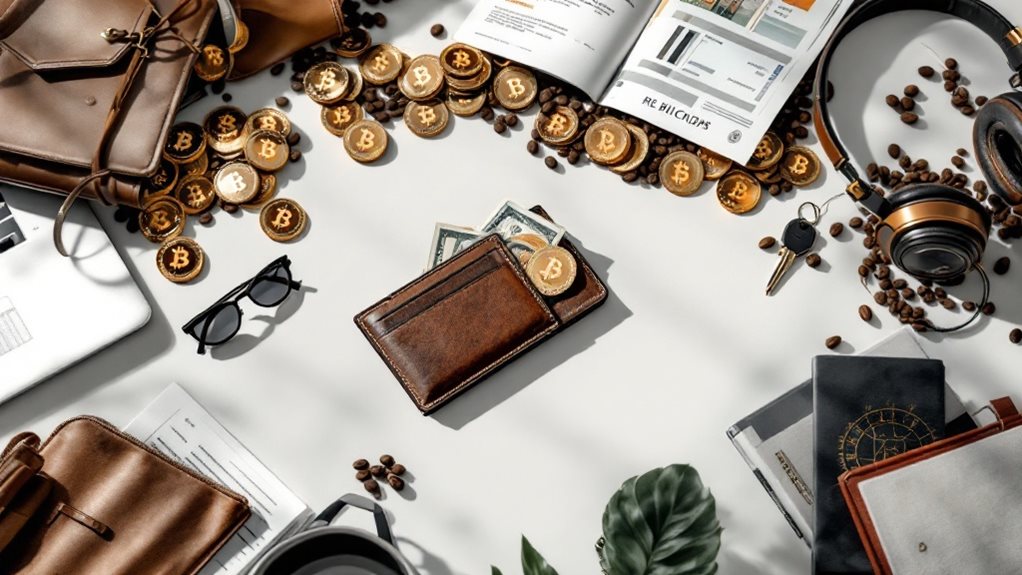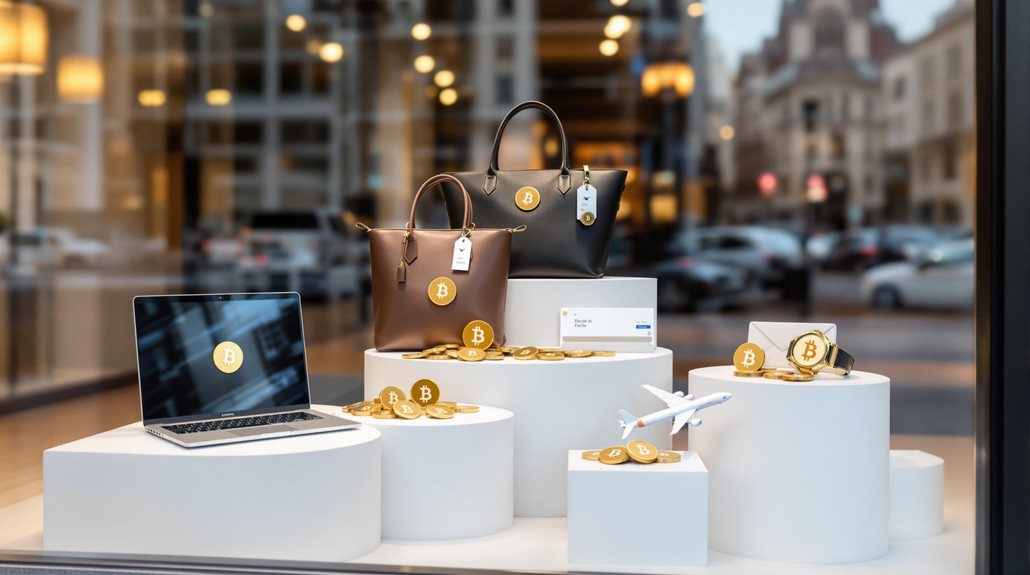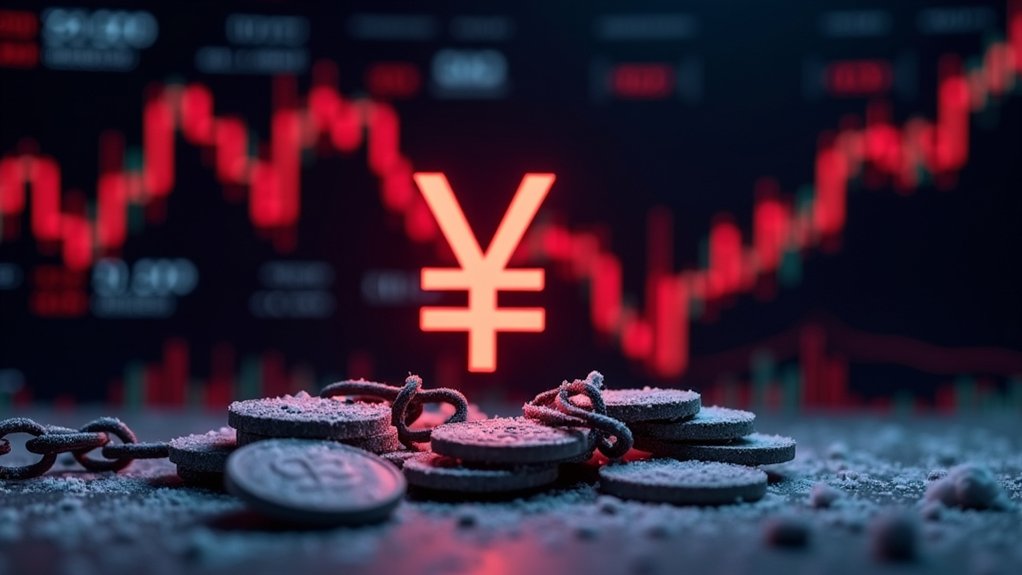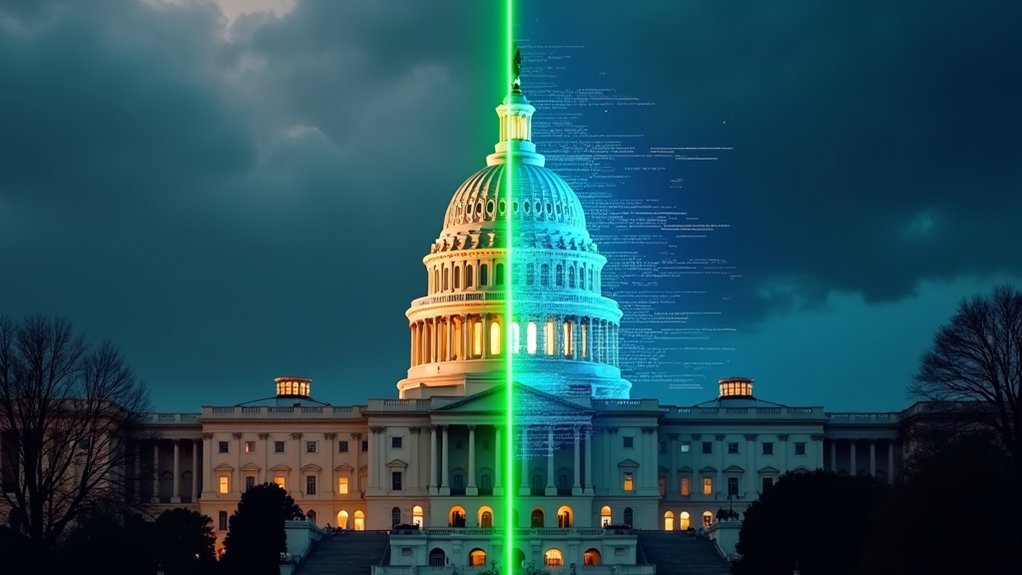Bitcoin can be used to purchase a wide variety of goods and services. Major retailers like Microsoft, Overstock, and Newegg accept the cryptocurrency for electronics and home goods. Travelers can book flights and hotels through CheapAir, while food enthusiasts can order at select Starbucks locations. High-value items like real estate, cars, and precious metals are also available with Bitcoin. Gift card services further expand spending options, making Bitcoin increasingly practical for everyday transactions.
Quick Overview
- Electronics and retail items from major stores like Overstock, Newegg, and Microsoft through direct Bitcoin payments.
- Travel accommodations including flights and hotels through services like CheapAir and third-party booking platforms.
- Food and beverages at select restaurants, Starbucks locations, and through various food delivery services.
- High-value assets including real estate, luxury vehicles, fine jewelry, and artwork from participating sellers.
- Gift cards for numerous retailers and precious metals from bullion dealers accepting cryptocurrency payments.

While Bitcoin started as a digital currency for tech enthusiasts, it’s now accepted at thousands of businesses worldwide. Major retailers like Overstock, Newegg, and Microsoft have embraced Bitcoin payments, allowing customers to buy electronics, furniture, and home decor with their digital coins. The decentralized system eliminates intermediaries, resulting in significantly lower transaction fees for both merchants and customers.
Although Amazon doesn’t directly accept Bitcoin, shoppers can still use it through third-party services like Purse.io. Shopify has also joined the trend, enabling its merchants to accept Bitcoin and over 300 other cryptocurrencies. Home Depot customers can purchase building materials and supplies using Flexa checkout systems.
The travel industry has widely adopted Bitcoin payments. CheapAir has been accepting Bitcoin for flight and hotel bookings since 2013, while Expedia and Booking.com allow Bitcoin payments through third-party services. Due to Bitcoin’s peer-to-peer nature, travelers can make borderless transactions without traditional banking intermediaries.
Luxury hotels and resorts are getting on board too, with some accepting Bitcoin directly. Travelers can find Bitcoin ATMs in many international airports, making it convenient to access their funds while abroad.
Food and beverage purchases with Bitcoin are becoming more common. Select Starbucks locations let customers load their digital wallets with Bitcoin, and restaurants in tech-savvy cities are increasingly accepting cryptocurrency payments.
Food delivery services like Takeaway.com now include Bitcoin payment options, and some grocery stores are starting to accept digital currencies. There’s even a growing number of specialty food retailers catering specifically to crypto enthusiasts.
Bitcoin’s use in high-value transactions is growing markedly. Real estate deals using Bitcoin are on the rise, particularly in the luxury property market. The first Bitcoin property sale occurred in September 2017 through Kuper Sothebys International Realty in Austin, Texas.
Some car dealerships now accept Bitcoin for vehicle purchases, and high-end jewelry and watch retailers are incorporating cryptocurrency payment options. Art galleries and auction houses have started allowing Bitcoin bids and purchases, creating new opportunities for collectors and investors.
The precious metals market has also embraced Bitcoin, with many bullion dealers accepting cryptocurrency payments.
Gift card services like CoinCards and Bitrefill have expanded Bitcoin’s purchasing power by allowing users to buy gift cards for various retailers.
This has created a bridge between the cryptocurrency world and traditional retail, making it easier for Bitcoin holders to spend their digital currency at places that don’t directly accept it.
As more businesses continue to adopt Bitcoin payments, the options for spending cryptocurrency keep growing, showing how digital currencies are becoming more mainstream in everyday transactions.
Frequently Asked Questions
How Do I Protect My Bitcoin Wallet From Hackers?
Bitcoin owners can protect their wallets from hackers in several proven ways.
Hardware wallets, which look like USB drives, keep private keys offline and away from internet threats.
Two-factor authentication adds an extra security layer, while strong passwords help prevent unauthorized access.
It’s also important to store recovery phrases offline on paper in secure locations.
Regular software updates and avoiding public Wi-Fi networks reduce vulnerability to attacks.
What Happens to My Bitcoin if I Lose My Private Key?
If someone loses their Bitcoin private key, they can’t access their Bitcoin – it’s like losing the only key to a safe.
There’s no way to reset or recover it. The Bitcoin isn’t actually gone; it’s still on the blockchain, but it’s locked away forever.
It’s estimated that about 1.57 million Bitcoin are currently inaccessible due to lost keys.
That’s billions of dollars worth that can’t be retrieved.
Can I Convert Bitcoin Back to Regular Currency Easily?
Converting Bitcoin to regular currency is pretty straightforward these days.
There are several common methods available. Cryptocurrency exchanges like Coinbase and Binance let users convert Bitcoin to dollars and other currencies.
Bitcoin debit cards offer instant spending power at regular stores.
Bitcoin ATMs provide cash withdrawals, though they charge higher fees.
P2P exchanges connect buyers and sellers directly.
Each method has its own fees and processing times.
Are Bitcoin Transactions Completely Anonymous?
Bitcoin transactions aren’t completely anonymous.
They’re pseudonymous, meaning they use public addresses instead of real names. While this provides some privacy, there are ways to trace transactions.
Companies can use blockchain analysis tools to link addresses to real identities. When people buy bitcoin through exchanges, they usually have to provide ID and personal information.
Additionally, IP addresses and digital footprints can sometimes reveal who’s behind transactions.
Why Does Bitcoin’s Value Fluctuate so Much?
Bitcoin’s price changes a lot because several key factors are at play. Its limited supply of 21 million coins means big trades can quickly move the price up or down.
News about regulations, security issues, or market adoption can trigger rapid buying or selling. Many traders also speculate on bitcoin’s future value, and this creates more volatility.
Since there’s no central authority controlling bitcoin’s price, it responds quickly to market forces.





